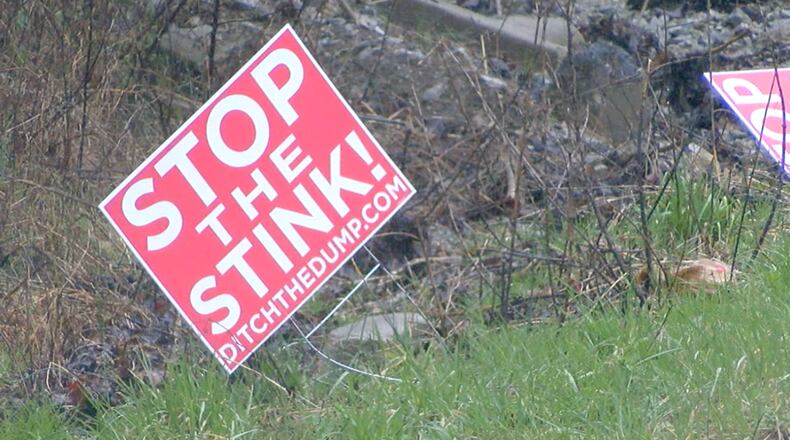Molly Yeager, Rumpke communications manager, said the company is building a new entrance on Sand Run Road because its entrance off Bond Road “hasn’t been ideal for safety reasons.”
That’s a concern for people who live along that road, including Katie Turner. Turner’s grandmother lives just across the state line, two driveways into Indiana. She plans on buying the property soon.
“This is like a second home to me,” Turner said. “It’s a dream come true. I’ve always always wanted to live here. We’re finally in a position where we’re ready to buy, ready to move our family in and then you find out Rumpke is increasing a dump on top of the hill.”
Turner is concerned about the environmental impacts of the expansion just up the hill from the property, but also about Sand Run Road traffic and future expansion.
“What does that mean for us when the trucks do come?” she asked. “Because it’s already a dangerous road.”
The 575-acre site sits on the Ohio-Indiana state line, and a coalition of opposition has formed among some residents in that part of Hamilton and Dearborn (Ind.) counties. Some of them expressed their concerns to the company — and EPA — at Wednesday’s meeting.
“What are you going to do?” Colerain resident Carrie Davis asked an EPA representative. “Who the hell is the EPA protecting? Them?”
Other speakers wanted to know more about future plans for the site and concerns about its impact on land, air and the nearby Whitewater River.
“I understand this is a necessity, but I also just need to make sure my business. I’m a fifth-generation here, I love this community and I love the Whitewater River,” Sharon Lutz, owner of Green Acres Kayak, told Bill Rumpke III at the meeting. “I have to trust you. My father trusted your grandfather for many decades and I just need to trust you.”
Lutz wasn’t alone. Karen Rudisell lives in a retirement community next to Green Acres, and spent years camping with her family along Whitewater.
“We have wonderful memories from out there,” Rudisell said. “So I’m extremely concerned about the water being polluted.”
Rudisell asked Rumpke officials about Ohio EPA violations and subsequent fines at its facility in Brown County.
“I just don’t know we know whether or not they’re going to obey the rules because they haven’t in the past,” she said at Wednesday’s meeting.
Rumpke’s Yeager said the company would be accountable.
“We hear the concerns and we have the same concerns,” she said. “Our goal is 100% compliance at every single site and if we fail, we’re going to fix it. We’re going to make it right. Rumpke is committed to doing the right thing.”
The company so far is only requesting to expand the daily maximum intake, and wouldn’t discuss whether there were plans for future expansion of the site.
For comparison, the Colerain Twp. landfill is permitted to receive a daily maximum intake of 12,500 tons but takes in an average of 9,000 tons per day, the company said.
The Ohio EPA will conduct a virtual public hearing at 6 p.m. Tuesday. Public comment ends May 4, and there will be a final decision on the daily limit within about 60 days.
WCPO is a content partner of the Journal-News.
About the Author
